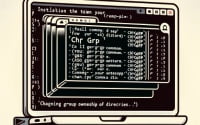Decompressing Files with ‘unzip’ | Installation and Usage

Are you struggling with unzipping files in Linux? Installing Linux commands can seem a bit daunting, however the ‘unzip’ command is a tool that is worth learning to install and use. The ‘unzip’ command help simplifies the process of extracting files from .zip archives in your Linux system. Additionally, it’s readily available on most package management systems, making the installation process straightforward once you know the steps.
In this guide, we will walk you through the process of installing and using the ‘unzip’ command in Linux. We will provide methods for both APT and YUM-based distributions, delve into compiling ‘unzip’ from source, installing a specific version, and finally, how to use the ‘unzip’ command and ensure it’s installed correctly.
Let’s get started and make file extraction a breeze on your Linux system!
TL;DR: How Do I Install and Use the ‘unzip’ Command in Linux?
The
'unzip'command is typically pre-installed on most Linux distributions. You can verify this with,unzip -v. However, if it’s missing, you can install it on Debian-based distributions like Ubuntu using the commandsudo apt-get install unzip. For RPM-based distributions like CentOS, you would run the commandsudo yum install unzip.
# For Debian-based distributions like Ubuntu
sudo apt-get install unzip
# For RPM-based distributions like CentOS
sudo yum install unzip
# Output:
# Reading package lists... Done
# Building dependency tree
# Reading state information... Done
# unzip is already the newest version (6.0-21ubuntu1).
# 0 upgraded, 0 newly installed, 0 to remove and 0 not upgraded.
This is just a basic way to install the ‘unzip’ command in Linux, but there’s much more to learn about installing and using ‘unzip’. Continue reading for more detailed information, advanced installation methods, and basic usage scenarios.
Table of Contents
- Understanding and Installing the ‘unzip’ Command
- Installing ‘unzip’ from Source Code
- Installing Specific Versions of ‘unzip’
- Basic Usage of ‘unzip’ and Verifying Installation
- Exploring Alternative Methods for Unzipping Files in Linux
- Troubleshooting Common ‘unzip’ Command Issues
- Understanding File Compression and Decompression in Linux
- The Relevance of File Compression and Decompression in System Administration and Data Management
- Exploring Related Concepts: Tarballs and Gzip Compression
- Wrapping Up: Installing the ‘unzip’ Command in Linux
Understanding and Installing the ‘unzip’ Command
The ‘unzip’ command is a widely used tool in Linux for extracting files from .zip archives. It’s a crucial part of file management for any Linux user, as .zip files are a common method for compressing and packaging multiple files together. Whether you’re downloading resources from the internet or transferring files between different systems, you’re likely to encounter .zip files.
Installing ‘unzip’ with APT
For Debian-based distributions like Ubuntu, the Advanced Package Tool (APT) is used to handle packages. To install the ‘unzip’ command, you would use the following command:
sudo apt update
sudo apt install unzip
# Output:
# Reading package lists... Done
# Building dependency tree
# Reading state information... Done
# unzip is already the newest version (6.0-21ubuntu1).
# 0 upgraded, 0 newly installed, 0 to remove and 0 not upgraded.
The first command updates the package list ensuring you get the latest version of the software. The second command installs the ‘unzip’ package.
Installing ‘unzip’ with YUM
For RPM-based distributions like CentOS or Fedora, the Yellowdog Updater, Modified (YUM) is the default package manager. To install the ‘unzip’ command, you would use the following command:
sudo yum check-update
sudo yum install unzip
# Output:
# Loaded plugins: fastestmirror, ovl
# Loading mirror speeds from cached hostfile
# Package unzip is already installed (current state: latest).
# Nothing to do.
The first command checks for system updates, and the second command installs the ‘unzip’ command.
Remember, the ‘unzip’ command is a fundamental tool for handling .zip files in Linux. Mastering its installation and basic use is the first step towards efficient file management in Linux.
Installing ‘unzip’ from Source Code
Sometimes, you might need to install ‘unzip’ from the source code. This could be due to the need for a specific version not available in your package manager or wanting to customize the build. Here’s how you can do it:
wget http://ftp.info-zip.org/pub/infozip/src/unzip60.tgz
tar xf unzip60.tgz
cd unzip60
make -f unix/Makefile generic
sudo make prefix=/usr/local install
# Output:
# Making install in unix
# make[1]: Entering directory '/home/user/unzip60/unix'
# gcc -o unzip ...
# make[1]: Leaving directory '/home/user/unzip60/unix'
This will download the source code, extract it, compile it using the makefile provided, and finally install it to /usr/local.
Installing Specific Versions of ‘unzip’
Installing Specific Versions from Source
You can specify the version number in the URL when downloading the source code:
wget http://ftp.info-zip.org/pub/infozip/src/unzip[version_number].tgz
Replace [version_number] with the specific version number you want to install.
Installing Specific Versions with APT and YUM
For APT:
sudo apt-get install unzip=[version_number]
For YUM:
sudo yum install unzip-[version_number]
Again, replace [version_number] with the specific version number you want to install.
| Version | Key Changes | Compatibility |
|---|---|---|
| 6.0 | Latest stable release | Compatible with all distributions |
| 5.5 | Last major release before 6.0 | Limited compatibility |
| 5.0 | Initial stable release | Limited compatibility |
Basic Usage of ‘unzip’ and Verifying Installation
Using the ‘unzip’ Command
To extract a .zip file, simply use the ‘unzip’ command followed by the name of the .zip file:
unzip file.zip
# Output:
# Archive: file.zip
# inflating: file.txt
This will extract the contents of file.zip to the current directory.
Verifying ‘unzip’ Installation
You can verify that ‘unzip’ is installed and accessible by checking its version number:
unzip -v
# Output:
# UnZip 6.00 of 20 April 2009, by Info-ZIP. Maintained by C. Spieler.
This will display the version number of ‘unzip’, confirming that it’s installed correctly and ready to be used.
Exploring Alternative Methods for Unzipping Files in Linux
While ‘unzip’ is a widespread tool for extracting .zip files, Linux provides other methods that can be used based on your specific needs. Let’s explore some alternatives.
Using ‘gunzip’ Command
‘gunzip’ is a command-line utility used for compressing or expanding .gz files. If you have a .zip file that’s been compressed with gzip, you can use ‘gunzip’ to extract it.
gunzip file.gz
# Output:
# file.gz: decompressed
This command decompresses the file.gz and replaces it with the uncompressed version.
Using Graphical File Managers
If you prefer a graphical interface, most Linux desktop environments come with a file manager that supports extracting .zip files. For instance, in Ubuntu, you can use ‘File Roller’, and in KDE, you can use ‘Ark’.
To extract a .zip file, you would right-click the file and select ‘Extract Here’.
Advantages and Disadvantages
While ‘unzip’ is powerful and versatile, ‘gunzip’ can handle .gz files more efficiently. However, ‘gunzip’ isn’t suitable for .zip files unless they’re compressed using gzip.
Graphical file managers provide a user-friendly interface and are excellent for beginners or those who prefer a GUI. However, they might not provide the level of control that command-line utilities offer.
In conclusion, the method you choose depends on your needs and comfort level. While ‘unzip’ is a great all-rounder, ‘gunzip’ and graphical file managers are worth considering based on your specific requirements.
Troubleshooting Common ‘unzip’ Command Issues
While ‘unzip’ is a straightforward command, you might encounter some issues while using it. Let’s look at some common problems and their solutions.
‘unzip: command not found’
If you see this error, it means that the ‘unzip’ command is not installed in your system. You can install it using the package manager for your distribution (APT for Debian-based distributions, YUM for RPM-based distributions).
# For Debian-based distributions like Ubuntu
sudo apt-get install unzip
# For RPM-based distributions like CentOS
sudo yum install unzip
# Output:
# Reading package lists... Done
# Building dependency tree
# Reading state information... Done
# unzip is already the newest version (6.0-21ubuntu1).
# 0 upgraded, 0 newly installed, 0 to remove and 0 not upgraded.
‘unzip: End-of-central-directory signature not found’
This error usually means that the .zip file is corrupt or incomplete. You might need to re-download the file or obtain a new copy.
‘unzip: Permission denied’
This error occurs when you don’t have the necessary permissions to read the .zip file or write in the destination directory. You can change the permissions using the ‘chmod’ command or use ‘sudo’ to run the command as root.
# Change file permissions
chmod 755 file.zip
# Unzip with sudo
sudo unzip file.zip
# Output:
# Archive: file.zip
# inflating: file.txt
Remember, the ‘unzip’ command is a powerful tool for managing .zip files in Linux. Understanding how to troubleshoot common issues will help you use ‘unzip’ more effectively.
Understanding File Compression and Decompression in Linux
Before diving deeper into the ‘unzip’ command, it’s essential to grasp the fundamental concepts of file compression and decompression in Linux. These concepts form the basis of the ‘unzip’ command and its counterparts.
What is File Compression?
File compression is a process that reduces the size of files and directories by eliminating redundancy. It’s akin to packing your suitcase when you travel. You try to fit as much as possible into a limited space. In the computing world, compression algorithms are the packing strategies that decide how to best fit data into a compressed file.
# Compress a file using gzip
gzip file.txt
# Output:
# file.txt.gz
In the example above, we use the ‘gzip’ command to compress a text file. The original file, ‘file.txt’, is replaced by the compressed version, ‘file.txt.gz’.
Why is File Compression Important?
File compression is crucial for saving disk space and facilitating file transfers. Compressed files take up less storage space, making it possible to store more files on your disk. They are also faster to transfer over networks due to their smaller size.
File Decompression in Linux
File decompression is the reverse of file compression. It involves extracting the original files from a compressed file. This is where the ‘unzip’ command comes into play in Linux. It’s used to decompress .zip files, which are commonly used to package multiple files together.
# Decompress a .zip file using unzip
unzip files.zip
# Output:
# Archive: files.zip
# inflating: file1.txt
# inflating: file2.txt
In the example above, we use the ‘unzip’ command to extract files from a .zip archive. The original files, ‘file1.txt’ and ‘file2.txt’, are restored to their original state before compression.
Understanding these fundamental concepts can help you better appreciate the functionality of the ‘unzip’ command and its role in file management in Linux.
The Relevance of File Compression and Decompression in System Administration and Data Management
File compression and decompression are not just about saving disk space or making file transfers faster. They are fundamental to system administration and data management in Linux. By compressing log files, backups, and large datasets, system administrators can optimize storage usage, ease data transfers, and ensure efficient utilization of system resources.
Exploring Related Concepts: Tarballs and Gzip Compression
While ‘unzip’ is a great tool for handling .zip files, there are other related concepts worth exploring. For instance, ‘tarballs’ (.tar files) are a common format for distributing multiple files in Linux. They are created using the ‘tar’ command, which stands for ‘tape archive’.
# Create a tarball
tar -cvf archive.tar file1 file2
# Output:
# file1
# file2
In the example above, we use the ‘tar’ command to create a tarball, ‘archive.tar’, containing ‘file1’ and ‘file2’.
Gzip compression is another essential concept in Linux. It’s a powerful compression algorithm used to compress individual files or tarballs.
# Compress a tarball using gzip
gzip archive.tar
# Output:
# archive.tar.gz
In the example above, we use the ‘gzip’ command to compress the ‘archive.tar’ tarball. The original tarball is replaced by the compressed version, ‘archive.tar.gz’.
Further Resources for Mastering Linux File Compression
To deepen your understanding of file compression and decompression in Linux, here are some resources:
- The Linux Command Line: A Complete Introduction – A comprehensive book that covers the Linux command line, including file compression commands.
Linux Journey – An online learning platform that offers lessons on various Linux topics, including file compression.
Linuxize – A blog that provides tutorials on various Linux topics, including step-by-step guides on using commands like ‘unzip’, ‘tar’, and ‘gzip’.
Wrapping Up: Installing the ‘unzip’ Command in Linux
In this comprehensive guide, we’ve delved into the installation and usage of the ‘unzip’ command in Linux. We’ve covered everything from the basic installation process to more advanced methods and even alternative approaches for file decompression.
We began with the basics, learning how to install the ‘unzip’ command in Linux using different package managers like APT and YUM. We then ventured into more advanced territory, exploring complex installation methods such as installing from source and installing specific versions. Along the way, we also learned about the basic usage of the ‘unzip’ command and how to verify its installation.
We also discussed common issues you might encounter when using the ‘unzip’ command and provided solutions to help you overcome these challenges. In addition, we explored alternative methods for unzipping files in Linux, such as the ‘gunzip’ command and graphical file managers.
| Method | Versatility | Ease of Use |
|---|---|---|
| ‘unzip’ | High | High |
| ‘gunzip’ | Moderate | High |
| Graphical file managers | Low | High |
Whether you’re a beginner just starting out with the ‘unzip’ command, or an experienced user looking for more advanced techniques, we hope this guide has provided you with valuable insights and solutions.
The ‘unzip’ command is a fundamental tool in Linux, and mastering its installation and usage is a valuable skill for any Linux user. Keep exploring, keep learning, and happy unzipping!


